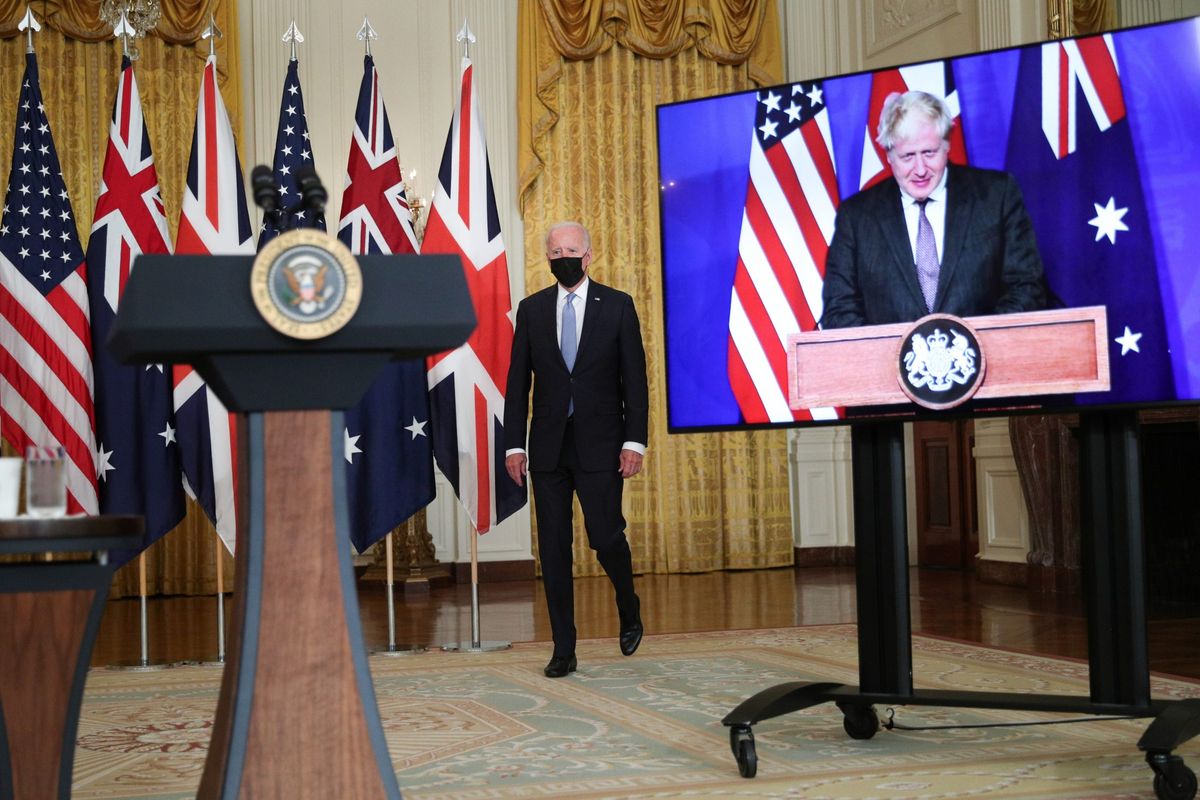How is the US, UK, Australia pact related to US-China relations?

A few minutes every morning is all you need.
Stay up to date on the world's Headlines and Human Stories. It's fun, it's factual, it's fluff-free.
Australia is only the second country to gain access to the American nuclear tech, allowing subs to be even stealthier and travel over longer distances than other subs. The first country was the UK in 1958.
What’s the nuclear sub deal?
- On September 16, Australia announced that it had entered a deal (called the AUKUS deal) with the United States and the United Kingdom, helping the country develop nuclear submarines.
- According to the US Navy, the kind of sub Australia is signing up for is “designed to seek and destroy enemy submarines and surface ships; project power ashore with Tomahawk cruise missiles and Special Operation Forces (SOF); carry out Intelligence, Surveillance and Reconnaissance (ISR) missions; support battle group operations; and engage in mine warfare.”
- The deal is being perceived as a way for Australia to counter China’s growing military influence in the Indo-Pacific, specifically in the South China Sea.
- For years, the South China Sea has been the center of territorial disputes, with several countries claiming sovereignty over the maritime area. It’s also home to vital shipping lanes, with nearly US$3.4 trillion worth of trade passing through the region annually.
- Now, this decision to work with the US and the UK is interesting because three years ago, during one of Australian Prime Minister Scott Morrison’s first foreign policy speeches, he said that “Australia doesn’t have to choose,” between the US and China.
- But, this deal says differently.
How did the world respond to the news?
- Speaking broadly, the nations that weren’t involved in the deal weren’t too crazy about it.
- France had the strongest reaction to the deal because it meant that the country lost out on its original nuclear sub deal with Australia, which was reportedly worth anywhere between US$40 billion to US$65 billion.
- After the announcement, it quickly canceled a gala in Washington meant to celebrate the US-French relationship and then recalled its ambassador to the US and its envoy to Australia.
- China also reacted angrily, with the Chinese embassy in Washington saying that “ … they should shake off their Cold-War mentality and ideological prejudice.”
- “This is utterly irresponsible conduct,” said Zhao Lijian, a Chinese Ministry of Foreign Affairs spokesman during a regular news briefing in Beijing.
Why’s there potential conflict in the Indo-Pacific?
- Most of the trouble in the Indo-Pacific revolves around the South China Sea, a body of water in Southeast Asia that’s home to the trade routes for trillions of dollars worth of global trade.
- Each country wants more of it for itself because, in theory, the more you have control over, the more prosperous your economy will be.
- And China has been accused of overreaching in the area, with American Vice President Kamala Harris saying on a trip to Vietnam in August that the US was looking to fight back against China’s “bullying and excessive maritime claims,” in the sea.
- She also indicated that the US would be looking to build its influence in the region and committed to increasing security support to Vietnam, including more visits by American warships.
How’s this related to Australia?
- One of the hurdles for the US, when it came to trying to gain more influence and competitiveness in the Indo-Pacific is that it’s literally on the other side of the world.
- The agreement, though, is a big step up for the Australian military.
- Australia is only the second country to gain access to the American nuclear tech, allowing subs to be even stealthier and travel over longer distances than other subs. The first country was the UK in 1958.
- This first deal with Australia isn’t overly binding, but most analysts think there’s more to come after this and that the US is looking to build a relationship there for the long term.
Why aren’t other European countries involved in this deal?
- Well, one reason is that, much like the US, countries in Europe are geographically far away from the region, and therefore don’t have that much military leverage.
- But the more significant reason, according to Benno Zogg, a senior researcher and team head of the Swiss and Euro-Atlantic Security Team for the Center for Security Studies in Zurich, is the difference in policy between EU countries and the US.
- “France and Europe more generally have taken a more cautious approach towards the challenge from China,” said Zogg in a TMS exclusive.
- “Strategic EU documents have called China a competitor and systemic rival. At the same time, there is a desire not to unnecessarily antagonize China, to maintain economic ties and keep it engaged in existing international fora.”
- According to Zogg, this kind of balance may be hard to achieve, but the alternative of “a New Cold War or turning China into a full antagonist” seems to not be in the interests of Europe either.
What’s next?
- According to Zogg, the alliance between the US, the UK and Australia, “will need to manifest itself in tangible processes and cooperation.”
- One of the challenges moving forward is that the US will have to improve its communication with countries in the EU. After France’s reaction to Australia dismissing their original deal and working with the US and UK, the US isn’t off to a great start.
- But, according to Zogg, “At least the alliance is motivated by a common perception of China as an antagonist and even a threat to the existing system.”
You drive the stories at TMS. DM us which headline you want us to explain, or email us at tips@themilsource.com







Comments ()